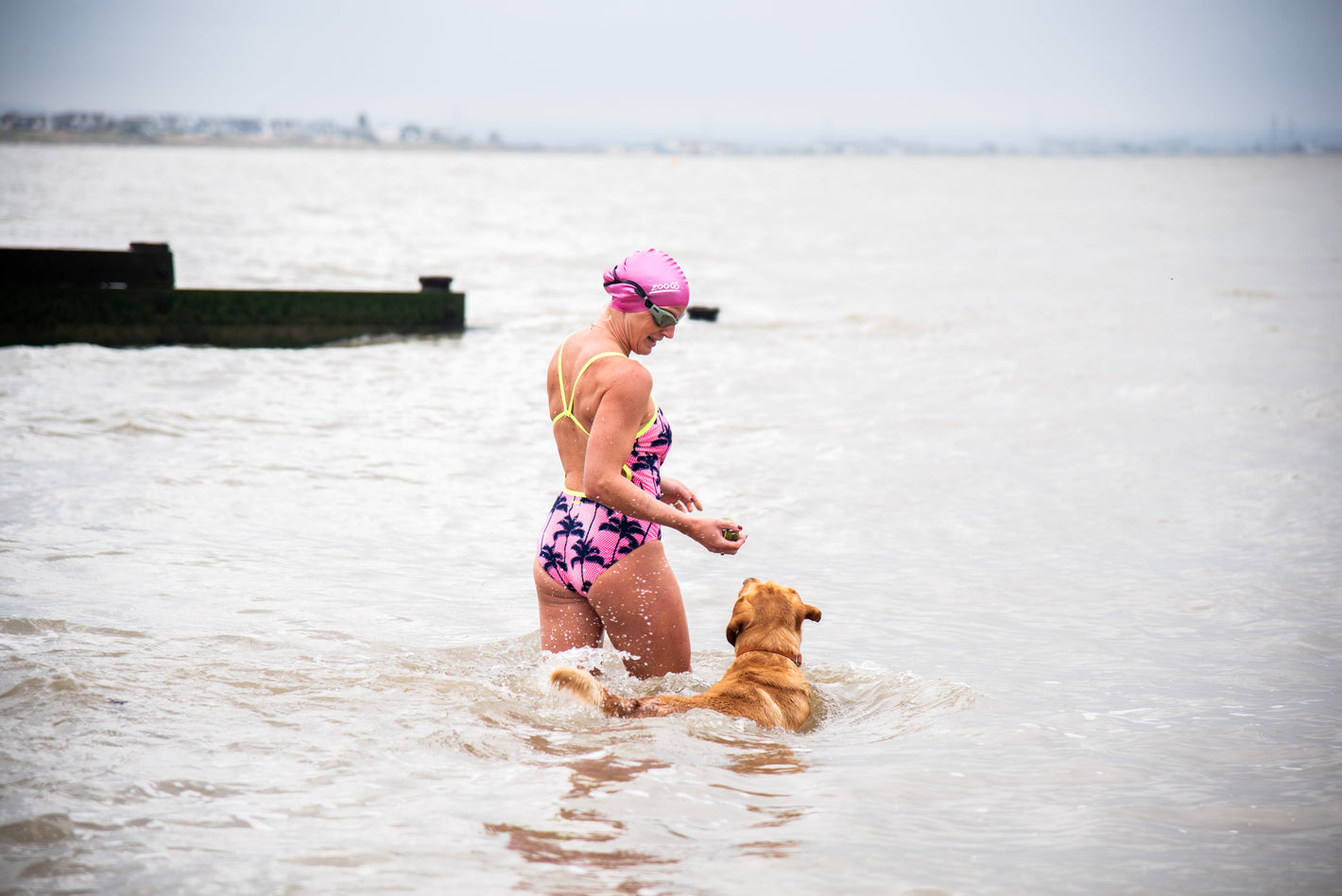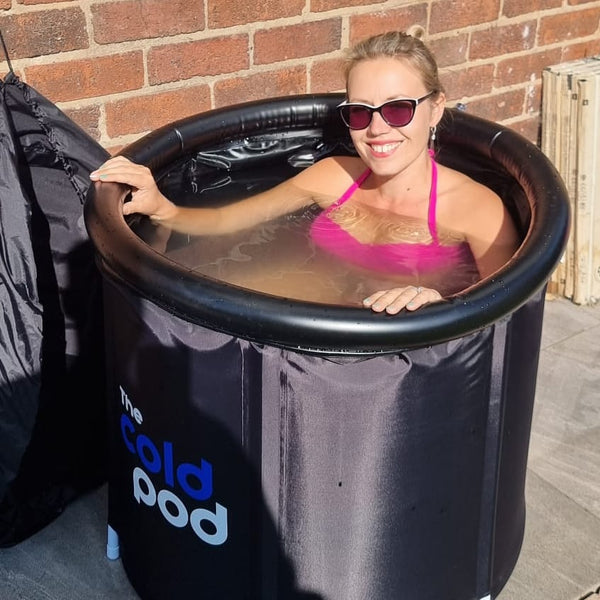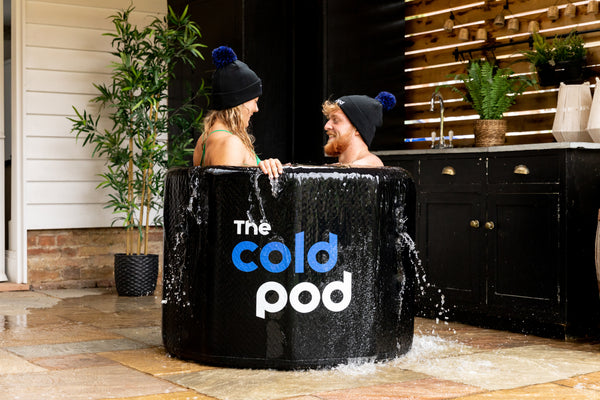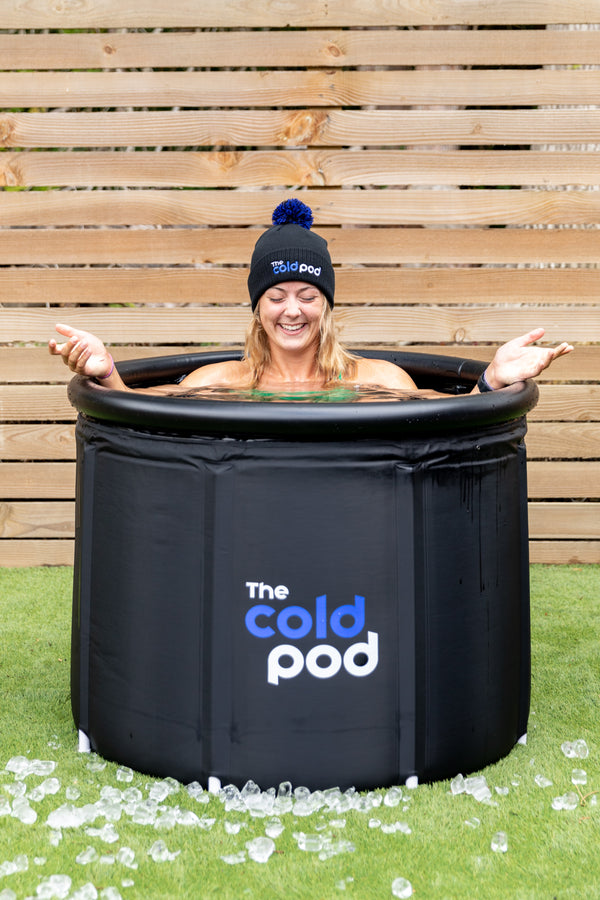Hardy sea swimmer Torsie Morley reveals how cold water has helped her through the exhaustion of early motherhood and the busy brain symptoms of ADHD. She also opens on the experience of loss and grief, and the role of cold water within this journey.

“I just couldn’t believe how good it felt to do something out of the ordinary than just change a nappy. I realised I’d been in a fog for three and a half years and that I felt awake for the first time. Yes, that was definitely the first buzz that came with it.”
I’ve travelled to Whitstable, a seaside town on the Kent coast, to meet up with Torsie, an all-year-round sea swimmer who documents her dips as @mothersseasanity on Instagram. It’s her version of journaling, she explains. Her writing is courageously frank and exposed, compelling to read. The ‘handle’ she has chosen as her identity says it all. She is mum of two, juggling the chaos of family life and, at alongside, striving to do something for herself which calms and rejuvenates. The sea has provided just that.
I drive down an uneven and picturesque lane, enviably close to the shingle beach, and park up outside a terraced hose with turquoise painted bricks. Torsie opens the vivid yellow front door with a blustery welcome. We hug, even though we've never met. There's a mutual and unsaid affinity between us because we're both sea swimmers. We already understand each other.
 The slender house stretches back further than its outward appearance suggests. There are cosy dark grey walls, rustic wood, and cascading plants. We sit in the garden with a cup of tea. Torsie puts a place of pastries on the table. Her golden Labrador, Archie, circles them hopefully.
The slender house stretches back further than its outward appearance suggests. There are cosy dark grey walls, rustic wood, and cascading plants. We sit in the garden with a cup of tea. Torsie puts a place of pastries on the table. Her golden Labrador, Archie, circles them hopefully.“I started swimming in the sea after I had my second baby, when my brain was
crumbling with lack of sleep and I felt exhausted and low,” Torsie tells me. “My husband was working 24/7, I didn’t have parents nearby for support and I hadn’t lived here long enough to make friends. I’d struggled with my first baby, and I wanted to make sure it didn’t happen again. I needed to move my body but, with two children under three, there was no way I could get to the pool, so I started using the stretch of wild water opposite my home. It was free, didn’t cost a penny, and it didn’t eat into too much family time, so I felt less guilt. I didn’t beat myself up for taking time for myself.”

I find myself nodding effusively, relating to the experience of isolation and with young children and a need to claw back therapeutic time for oneself.
“It makes me emotional to look back because I now see I was in a dark place,
verging on depression,” Torsie continued. “I felt vulnerable and trapped. The wiring in my brain felt muddled, and I needed an outlet.”
Cold water does indeed provide am outlet, a means of release. It relieves cortisol, the stress hormone; triggers our happy hormones known as endorphins, and heightens our dopamine levels, helping to lift us out of low mood.
“The difference in me was incredible. My husband recognised it too. He’d say, ‘You go to the sea one person and come back a different person.’ Sometimes he’d just say, ‘You miserable cow, go and have a swim!’”
 Torsie laughs here. She laughs a lot, I’ve observed. There’s an outwardly bright, optimistic, and outgoing demeanour to her which I’m very attracted to. It reminds me that all have our hidden struggles, some big, some small. Just because we can’t see them doesn’t mean they’re not there.
Torsie laughs here. She laughs a lot, I’ve observed. There’s an outwardly bright, optimistic, and outgoing demeanour to her which I’m very attracted to. It reminds me that all have our hidden struggles, some big, some small. Just because we can’t see them doesn’t mean they’re not there.
“I loved learning, pushing my body and mind to see what it could tolerate,” Torsie tells me enthusiastically. “As someone with ADHD, it also brought organisation and clarity to my head. It was like a mini adventure, and I looked forward to amongst the chaos at home. These daily swims became a way of life like brushing my teeth
and I would make it happen no matter what. Some days it was stressful trying
to get out into the water to get my fix. Sometimes I’d be swimming in very small amounts of water as the tide emptied the bay. But I was having my swim whatever! I had to. It was like going to therapy.”
 We take a little break from our chat. Torsie puts a purple onesie on top of her swimming costume. We pick our cups of tea up and mosey down to the beach. Archie follows, keen for outdoor exploration. The sky is muted and uneventful today. The air is still. It takes us a mere sixty seconds to arrive at the long stretch of shingle divided up by wooden groynes. Here, the sea mixes with the Thames estuary. Directly opposite sits the Isle of Sheppey. It seems close. Swimmable, surely? Torsie reads my thoughts. Twelve miles, she informs me. I’m surprised. That’s a hell of a big swim. Distances can be so deceiving.
We take a little break from our chat. Torsie puts a purple onesie on top of her swimming costume. We pick our cups of tea up and mosey down to the beach. Archie follows, keen for outdoor exploration. The sky is muted and uneventful today. The air is still. It takes us a mere sixty seconds to arrive at the long stretch of shingle divided up by wooden groynes. Here, the sea mixes with the Thames estuary. Directly opposite sits the Isle of Sheppey. It seems close. Swimmable, surely? Torsie reads my thoughts. Twelve miles, she informs me. I’m surprised. That’s a hell of a big swim. Distances can be so deceiving.
“Tell me about your challenges,” I urge as we perch on the lower step of a wooden and weathered groyne.
“In 2023, I did the Channel relay. It was amazing, the best thing I’ve ever done.” As Torsie talks, she throws a ball for Archie who bounds around the shingle in chase of it. “However, it ruined my swims! I missed the quietness, the time to myself, the
meditative aspect of swimming. It became very noisy out there! Yes, there were times when I thought, what am I doing? I’m not even a good swimmer! Why am I swimming across the busiest shipping lane in Europe? What a wally!” Once again, she laughs.
“I wanted to quit so many times,” she continues. “I’d come out of the sea hypothermic, not being able to stop shivering. I’d see strong swimmers coming out of the sea frothing at the mouth, disoriented, not being able to speak, their feet having gone white. It shook me up. However, it’s amazing what you can achieve through mental strength and others cheering you on. I hate letting people down as well, so the fact I was in a team meant that I couldn’t let that team down. I had to commit and go for it.”
 As Torsie talks about the experience of the Channel relay I get a sense of the camaraderie which formed from the hardship involved. By nature, us human beings are tribal. It goes back all the way to our caveman days. Every single one of us craves the feeling of being part of something bigger than ourselves. This appears to be one of the things Torsie found on her journey through the choppy waters.
As Torsie talks about the experience of the Channel relay I get a sense of the camaraderie which formed from the hardship involved. By nature, us human beings are tribal. It goes back all the way to our caveman days. Every single one of us craves the feeling of being part of something bigger than ourselves. This appears to be one of the things Torsie found on her journey through the choppy waters.
“I hate it when people say, “Oh, you swam for just an hour. Is that all?” It’s the
biggest thing I’ve ever achieved, and it hurts me to my core when they say it. It’s so much more than that hour in the sea. The training is so tough! Swimming in just ‘skins’ without my hat, gloves and boots was new to me. The jellyfish would leave marks on my body where they’d whip me. That hour of swimming followed by shivering, feeling tired, warming up, feeding yourself, and then starting the next swim was an intense experience.”
 As we sit on the beach, a group of brent geese fly past us, in line with the horizon. A secret twitcher, Torsie says she has become. These birds arrive in October and leave in April. They’re part of her swim experience, a connection with nature that can never be found in the chlorine-treated waters of the local swimming pool.
As we sit on the beach, a group of brent geese fly past us, in line with the horizon. A secret twitcher, Torsie says she has become. These birds arrive in October and leave in April. They’re part of her swim experience, a connection with nature that can never be found in the chlorine-treated waters of the local swimming pool.
“Any tips for newbies who want to start dipping?” I ask Torsie.
“Always listen to your body,” she says firmly, “not a flashy watch on your wrist which measures your time & distance. Don’t listen to technology! Our bodies can handle different conditions on different days. Sometimes the sea is a little bit colder or the sky not as sunny. When people ask, how long do I swim for, I say it depends on how I feel in the water, and how my body copes. I am constantly checking in with myself. I really get jealous of swimmers who are experiencing the first year of their cold-
water experience because there is so much to learn, and the buzz is so much
more heightened because it’s the first time of doing it. That first year was really
special for me.”
 Before Torsie heads into the sea, I pose one final question. I know she has experienced profound loss recently because she has reflected on it in her ‘Insta-journal’. I ask her if she’d like to talk about her mum passing away. It’s quite raw, she tells me, but takes a deep breath and speaks.
Before Torsie heads into the sea, I pose one final question. I know she has experienced profound loss recently because she has reflected on it in her ‘Insta-journal’. I ask her if she’d like to talk about her mum passing away. It’s quite raw, she tells me, but takes a deep breath and speaks.
“My mum recently passed way in three months ago. She battled Alzheimer’s for two years, and it was the hardest thing to see, losing her more and more, bit by bit. When I’m out there in the sea, I feel close to her, as it was her who taught me life is an adventure, that I should create an adventure wherever I am. I’m definitely on a bit of a journey grieving for her at the moment. Cold water helps me through that. It’s helped me through so many different things.”
Torsie holds herself together as she talks about the gap in her life without her mum, but I sense the emotion within her and I know that it’s the perfect time for a swim. She sheds the coat and onesie, stretches her swim hat over her long hair and goggles over her eyes, strides into the sea and dives into the cold. Her companion, Archie, launches in too. They swim side by side, him watching over her. When they’re satisfied with their effort, I quickly pull my swimsuit on and wade in with a deep breath.
 “Get your head under!” Torsie tells me. “That’s where the magic happens!”
“Get your head under!” Torsie tells me. “That’s where the magic happens!”
She pulls her hat off, and we count to three before ducking our bare heads under the water. The zing is instant and fog-blasting. Today is a wrap, but the story is not complete. A week later, I pop back in to see Torsie at home again. She has been working at Whitstable’s seafront sauna all day, keeping the stove hot and the ice barrels full. As a result, she’s missed the high tide and can’t get her swim in. We extract giant ice cubes from the freezer, smash them up with a hammer, and she immerses, getting her essential cold fix for the day.
 “The ice bath can’t replace the exhilaration I find out there in the sea but it’s such a good alternative when I need a quick reset, when my ADHD brain is spiralling. Dipping my head in even helps with my migraines. I used to get frozen peas and put
“The ice bath can’t replace the exhilaration I find out there in the sea but it’s such a good alternative when I need a quick reset, when my ADHD brain is spiralling. Dipping my head in even helps with my migraines. I used to get frozen peas and put
them against my forehead, even buy those cold forehead sticks, but now I put
my head under the ice and it instantly goes away. I love the head freeze!”
 I’ve taken so much away from my time spent with Torsie, namely an understanding of how cold-water benefits those with ADHD and how the spirit of lost loved ones can be found out there in the solitude of the sea. My approach to cold water immersion has also changed.
I’ve taken so much away from my time spent with Torsie, namely an understanding of how cold-water benefits those with ADHD and how the spirit of lost loved ones can be found out there in the solitude of the sea. My approach to cold water immersion has also changed.
I am going to do far more head dunking.







